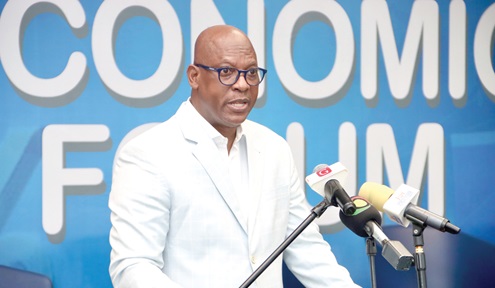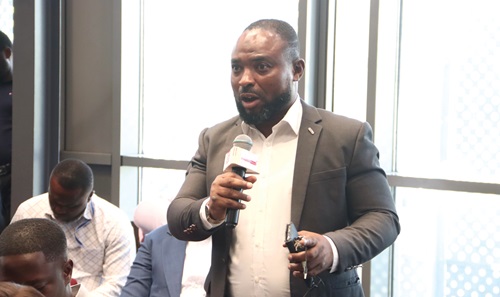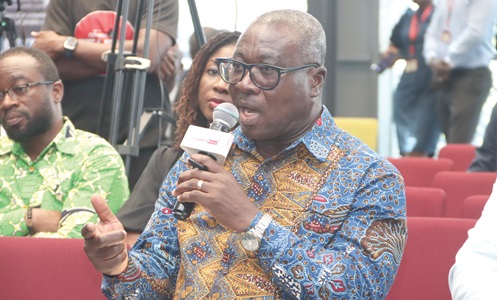The maiden Daily Graphic-Ecobank Ghana Business Forum was yesterday held in Accra where speakers discussed the economy and its prospects to broaden the country’s growth model beyond gold and cocoa exports.
“Undoubtedly, gold and cocoa are key drivers in the recovery process but are limited in scope. We need to build on the extractive sector with value addition and diversification to achieve long-term prosperity and employment generation,” the First Deputy Governor of the Bank of Ghana (BoG), Dr Zakari Mumuni, said at the opening of the forum at the Ecobank Head Office in Accra.
It was on the theme: “Broad review of the economy of Ghana then, now, and way forward”.
Among speakers and panellists who featured at the event were the Presidential Advisor on Economy, Seth Terkper; the Director, Institute of Statistical, Social and Economic Research (ISSER) of the University of Ghana, Prof. Peter Quartey, and Tax Partner at PwC Ghana, Abeku Gyan-Quansah.
Others included policymakers, private sector actors, civil society and academicians.
They discussed topics such as effective controls that promote sustainable economic growth and innovative strategies to ensure long-term fiscal management, and ways to broaden the tax base and identify innovative revenue mobilisation methods to boost economic growth.
Resetting economy
The First Deputy Governor, whose speech was read on his behalf by a director at the Office of the Governor, Osei Gyasi, said it was important to recognise that macroeconomic stability was a necessary condition, but not sufficient to fully reset the economy.

Ato Afful, Managing Director, Graphic Communications Group Ltd, addressing the participants
He said stability strengthened the economic fundamentals but structural transformation provided direction for sustainable and inclusive growth.
Dr Mumuni, therefore, said that to fully reset the nation’s economy, the government must broaden the growth model beyond the extractive sector.
“In so doing, we must leverage the African Continental Free Trade Area (AfCFTA) to position Ghana as a regional hub for agro-processing, light manufacturing, and logistics, among others,” he added.
Cedi appreciation
The Managing Director (MD) of the Graphic Communications Group Ltd. (GCGL), Ato Afful, said that the recent appreciation of the cedi was a significant development for businesses operating at the heart of the economy.

Suleiman Mustapha, acting Editor, Graphic Business, asking a question at the event
He said that media organisations such as GCGL played significant roles in the country's economy, extending far beyond their traditional role as information conveyors.
“For those of us at Graphic Communications, we are not just journalists or media strategists. We also deal directly with the economy.
We import printing plates, paper and ink, which are commodities heavily influenced by foreign exchange rates. So, when there is a positive shift in the value of the cedi, we feel the impact firsthand,” the MD said.
He mentioned the cost pressures facing GCGL due to foreign exchange volatility to include the high cost of importing paper, which costs around $100,000 for a six-week supply, with taxes amounting to 41 per cent.
The company incurs further costs of approximately $31,000 for other printing materials, thus exacerbating its financial burden.
“This tells you what we go through every day; so, whatever the issues and challenges are, any positive movements in the cedi are deeply appreciated by those of us operating on the front lines of the economy,” Mr Afful added.
Tax regime
Prof. Quartey also said that the country’s current tax regime promoted evasion and enriched a select few at the expense of national development.

Eric Amponsah Boateng, Tax Consultant, PKF, asking a question
He said the imposition of high taxes on individuals and businesses in an effort to meet fiscal targets undermined public confidence in the tax system.
“Our tax levels are too high in my view. Our VAT is 21 per cent plus. Some are even straight levies that you cannot claim input tax on.
“But look at our competitors, some of whom on the average, are paying 15 per cent and 18 per cent, while we are charging over 21 per cent.
So, what you are doing is that you are encouraging people to evade,” Prof. Quartey said.
For his part, Mr Gyan-Quansah called on the government to build public confidence by providing clear assurance that tax revenues were being used effectively.
He said it must prioritise improving compliance rates, simplify the overall tax system to make it more user-friendly, and strictly enforce tax laws to ensure fairness and accountability across all sectors of the economy.
